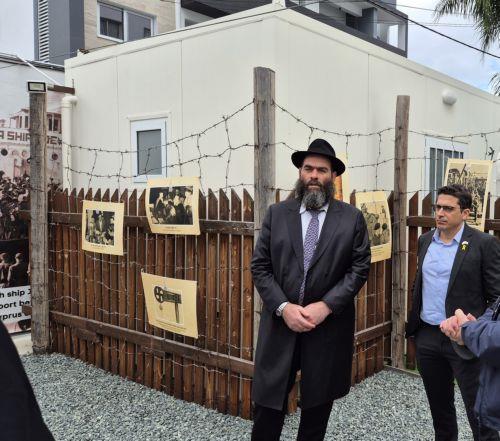The Cyprus Jewish community is engaged in discussions relating to its growth on the island, including its concerns over security, diplomacy, education and antisemitism.
Meanwhile, owing to the rapid influx of Israeli families to Cyprus following the Hamas attack on October 7, 2023, the island’s first Jewish private school is set to open its doors in Limassol.
According to a press release from the office of the Chief Rabbi of Cyprus, on Wednesday Israel’s Diaspora Minister Amichai Chikli had visited the community in Larnaca to discuss a variety of topics.
“With an estimated 4,000 Jewish families now residing in Cyprus, the community has experienced substantial growth over the past two decades,” a press release after the meeting said.
Major waves of arrival included 70 families in 2003, 500 prior to the Covid-19 pandemic, 1,000 following changes in the legal system, and a significant increase in migration during and after October 7, 2023.
Chief Rabbi of Cyprus Arie Zeev Raskin and the Israeli official discussed diplomatic initiatives, security challenges and the rise of antisemitism in the region.
The importance of fostering a safe and thriving environment for the Jewish community while also strengthening the longstanding relationship between Cyprus and Israel was highlighted.
“The Jewish community of Cyprus remains committed to enhancing cultural and diplomatic ties between the two nations and ensuring the wellbeing and security of its members,” the press release said.
Elsewhere in Limassol, the island’s first Jewish school is set to open its doors in 2027. The institution which will serve pupils of primary through high school age, was made possible by a €50 million investment from the Yael Foundation, the Jerusalem Post reported.
The school is to feature state-of-the art facilities, including earthquake proofing and sustainable design, and is expected to accommodate 1,500 students, according to the news site.
The daily said that “the need for a school in Limassol arose due to the island being an attractive destination for the Jewish community with many Israelis drawn by the island’s affordability and business opportunities.”
Limassol had become a hub for Israelis, partly due to collaboration between the local university [Tepak] and Israeli medical and scientific institutions.
Private English-speaking schools in Cyprus were not able to provide the “immersive Jewish experience many families desired”, although they had made adaptations, such as offering kosher meals.
The Cypriot government had been “exceptionally welcoming” and open to revising the legal framework for the school so it can operate on a for-profit basis, unlike other private schools on the island, Rabbi Yehoshua Smukler, the school’s future head is quoted as saying.
The school would be open to all Jewish denominations and represent the entire spectrum of Jewish life, Smukler is quoted as saying, adding that he envisioned “a Zionist school” that would “proudly proclaim the Jewish identity”.
Earlier in the week the Yael Foundation brought together 200 Jewish thought leaders for a conference in Limassol, with attendees from 37 states, to discuss advancing Jewish education in the aftermath of October 7.
The foundation’s stated aim is to accommodate the global needs of the Jewish community in light of rising rates of antisemitism
“Our enemies have relentlessly targeted the global Jewish community with unprecedented antisemitism. This assault directly targets Jews and Jewish heritage, resulting in large numbers of Jews who have been forced to hide and disengage from their identity and traditions,” one of the foundation’s founders Uri Poliavich, said in his address, adding that the antidote to this was more Jewish education.
Yael Foundation, under the motto “No Jewish Child Left Behind”, is currently embarking on a mapping out of countries in Europe suitable for promoting Jewish education, according to Jewish media.
It is present in roughly three dozen countries, impacting 13,000 students, and provides grants to 55 day-schools, 18 Sunday schools, 10 kindergartens and 17 after-school educational programmes.






Click here to change your cookie preferences